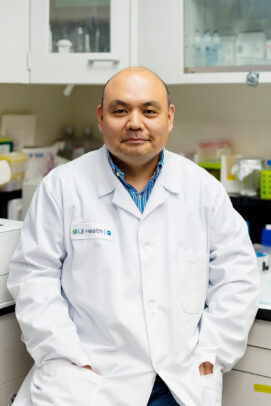UIC’s Yamada elected National Academy of Inventors fellow for cancer work
For his innovative work using new types of agents for cancer therapy and imaging, Tohru Yamada of the University of Illinois Chicago was elected a 2023 fellow of the National Academy of Inventors.
Yamada, an associate professor in the departments of surgery and biomedical engineering at UIC, has spent two decades studying whether bacterial proteins and their fragments could be effective anticancer agents. One promising candidate, a peptide called p28, has been tested in two clinical trials in patients with advanced solid tumors and in pediatric patients with recurrent and refractory central-nervous-system tumors.

“I am deeply intrigued by a niche area of research, where I am passionate about exploring novel and groundbreaking approaches,” Yamada said. “So I’m continuing to generate innovative ideas and patents.”
Using live bacteria against cancer is an old idea, Yamada said. More than a century ago, surgeon W. Coley treated patients who had inoperable sarcoma with live bacteria and found anti-tumor effects. Coley’s finding still influences the field of cancer immunotherapy today. But to avoid the risk of infection, scientists have searched for the specific factors secreted by bacteria that fight cancers.
In his research, Yamada and his collaborators worked on a protein called azurin from the opportunistic pathogen Pseudomonas aeruginosa. They refined the protein down to a small p28 peptide, which proved exceptional at finding and preferentially penetrating cancer cells. Once inside, p28 activates a tumor-suppressing gene and designates those cells for destruction by inhibiting growth.
Even better, p28 can cross the blood-brain barrier, the protective layer that prevents many drugs from crossing into the central nervous system. That made it a promising candidate for hard-to-treat brain and central-nervous-system tumors, the targets of the phase I clinical trial of p28 as a monotherapy.
Yamada has continued to explore other uses for the tiny but powerful compound. For example, by attaching p28 to a fluorescent marker, surgeons can distinguish cancer cells from normal cells during surgery. Using a fluorescence camera during the operation, they potentially could see the cells light up and ensure they remove the entire tumor without leaving behind any cells to form new tumors.
Yamada is also researching other bacteria-cancer interactions, including the makeup of the tumor microbiome, the bacterial species that live in the tumor microenvironment. The National Cancer Institute recently funded that project through an R01 grant. Targeting the bacteria unique to tumors, as compared to those in other parts of the body, may generate new approaches to treating cancer, he said.
“I’m deeply humbled and immensely grateful to be elected for the National Academy of Inventors,” said Yamada, who is also a member of the University of Illinois Cancer Center. “This is not just a personal achievement. Innovative projects need collaborative efforts. None of this would have been possible without the generous support of our sponsors and partners.”
Yamada is the second UIC faculty member to be elected as a National Academy of Inventors fellow. Eben Alsberg, the Richard and Loan Hill Chair in the biomedical engineering department, who has a doctorate degree in biomedical engineering and is also a member of the cancer center, was selected last year. Among all the academy fellows, 710 are members of the National Academies of Science, Engineering and Medicine and 53 are Nobel Laureates. The 2023 class of the National Academy of Inventors fellows includes 217 people from 118 research institutions worldwide who will be honored at a meeting in June 2024.
